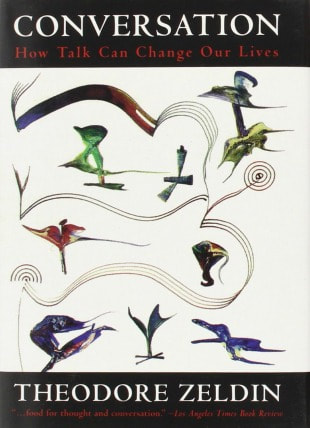- Home
- Process Worldview
- Community
- Art and Music
- Whitehead and Process Thinking
- Podcasts
- Spirituality
- Ecological Civilization
- Education
- Contact
- Social Justice
- Science
- Animals
- Sacred Poems
- Whitehead Videos
- Index of All Titles
- Practicing Process Thought
- Process Spirituality: A Spiritual Alphabet
- Recent Posts
The Big Talk Movement
What is Big Talk?
"Big Talk is a communication approach that facilitates more meaningful connections—with friends, family, coworkers, teammates, classmates, strangers, and even oneself. Through the process of skipping the small talk to ask more open-ended and thought-provoking questions, people can exchange life stories, lessons, and experiences to enhance their interpersonal relationships.
Why Make Big Talk?
"Modern-day social isolation has contributed to a silent epidemic of loneliness and a painful sense of disconnection within communities. With technology, it’s easy to reach a million people all over the world, yet it’s become harder for people to initiate deep and meaningful conversations in everyday life. While face-to-face social connection is strongly associated with well-being and happiness, heavy use of screens – social media platforms in particular – is associated with feelings of depression and lower life satisfaction.
"Learning how to make Big Talk helps to fight those feelings of isolation, through encouraging thoughtful interaction, active listening, and storytelling. This translates into better verbal communication skills, more purposeful relationships, and a greater sense of belonging at work, home, school, within communities, and in the broader world...more
"Big Talk is a communication approach that facilitates more meaningful connections—with friends, family, coworkers, teammates, classmates, strangers, and even oneself. Through the process of skipping the small talk to ask more open-ended and thought-provoking questions, people can exchange life stories, lessons, and experiences to enhance their interpersonal relationships.
Why Make Big Talk?
"Modern-day social isolation has contributed to a silent epidemic of loneliness and a painful sense of disconnection within communities. With technology, it’s easy to reach a million people all over the world, yet it’s become harder for people to initiate deep and meaningful conversations in everyday life. While face-to-face social connection is strongly associated with well-being and happiness, heavy use of screens – social media platforms in particular – is associated with feelings of depression and lower life satisfaction.
"Learning how to make Big Talk helps to fight those feelings of isolation, through encouraging thoughtful interaction, active listening, and storytelling. This translates into better verbal communication skills, more purposeful relationships, and a greater sense of belonging at work, home, school, within communities, and in the broader world...more
Transforming the World Together
“I believe we can change the world if we start listening to one another again. Simple, honest, human conversation. Not mediation, negotiation, problem-solving or public meetings. Simple, truthful conversation where we each have a chance to speak, each feel heard, and each listen well . . . It takes courage to start a conversation. But if we don’t start talking to one another, nothing will change. Conversation is the way we discover how to transform our world, together.”
— Margaret J. Wheatley in Turning to One Another
— Margaret J. Wheatley in Turning to One Another
Conversation Creates New Cards
For the philosopher Whitehead, the metaphysical ultimate is not a thing or a substance or even One of which all things are manifestations. It is "the production of novel togetherness." As he puts it: "The many become one, and are increased by one."
One way to illustrate this is by considering a conversation as described by Theodore Zeldin. He is a British historian and philosopher known for his focus on the power of conversation and understanding between people. In one of his books, Conversation, he writes:
“Conversation is a meeting of minds with different memories and habits. When minds meet, they don’t just exchange facts: they transform them, reshape them, draw different implications from them, engage in new trains of thought. Conversation doesn’t just reshuffle the cards: it creates new cards.”
The creation of "new cards" illustrates what Whitehead means by a production of novel togetherness. Zeldin thinks a recovery of the arts of conversation is key to any kind of just, sustainable, creative future. Process philosophers influenced by Whitehead think the same.
- Jay McDaniel
Book Review
by Frederic and Mary Ann Brussat
in Spirituality and Practice

'It's good to talk' was the slogan of the twentieth century, which put its faith in self-expression, sharing information and trying to be understood. But talking does not necessarily change one's own or other people's feelings or ideas. I believe the twenty-first century needs a new ambition, to develop not talk but conversation, which does change people. Real conversation catches fire. It involves more than sending and receiving information. So writes Theodore Zeldin, a fellow and former dean of St. Antony's College, Oxford, and author of An Intimate History of Humanity.
This charming and right-on-the-money volume will speak to all those tired of the egocentric posturing and adversarial stance of so much that passes for talk today in both the private and the public arenas. "There are more interesting things in life," notes the author, "than polishing one's armor."
Zeldin praises lively and adventuresome conversation that expands horizons, challenges imaginations, and acknowledges mystery. He presents his ideas on saving family dialogue, taking the conversation of love into new directions, and enriching talk at work.
The author suggests that we set up occasions for sharing ourselves, our ideas, and ideals with those who are different from us. Zeldin quotes a councilwoman and lawyer who says: "Without conversation, the human soul is bereft. It is almost as important as food, drink, love, exercise. . . . People in solitary confinement, like Terry Waite, keep themselves sane by having imaginary conversations with themselves." This is a salutary resource for book discussion groups or salons interested in exploring the civility that is created by open-ended and wide-ranging conversation.
This charming and right-on-the-money volume will speak to all those tired of the egocentric posturing and adversarial stance of so much that passes for talk today in both the private and the public arenas. "There are more interesting things in life," notes the author, "than polishing one's armor."
Zeldin praises lively and adventuresome conversation that expands horizons, challenges imaginations, and acknowledges mystery. He presents his ideas on saving family dialogue, taking the conversation of love into new directions, and enriching talk at work.
The author suggests that we set up occasions for sharing ourselves, our ideas, and ideals with those who are different from us. Zeldin quotes a councilwoman and lawyer who says: "Without conversation, the human soul is bereft. It is almost as important as food, drink, love, exercise. . . . People in solitary confinement, like Terry Waite, keep themselves sane by having imaginary conversations with themselves." This is a salutary resource for book discussion groups or salons interested in exploring the civility that is created by open-ended and wide-ranging conversation.


